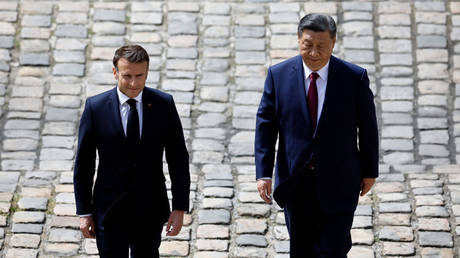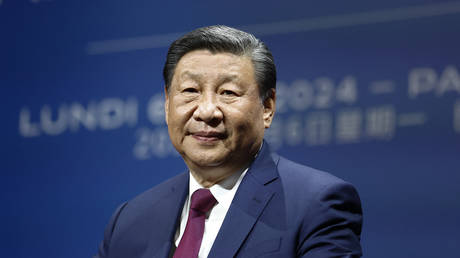ARTICLE AD BOX
China wants to preserve and strengthen its foothold in and around the EU and is investing diplomatic effort where it is worth it
Chinese President Xi Jinping is on a state visit to Europe. On what is his first trip to the EU since 2019, he has visited France and Hungary and concluded the tour in Serbia.
The trip comes at a pivotal moment, when European Commission President Ursula von der Leyen is attempting to flip the EU institution against China, having initiated dozens of probes on Chinese products in recent weeks. Likewise, the US has aggressively ramped up rhetoric accusing Beijing, accusing it of complicity in the Ukraine conflict, designed of course to undermine Xi’s credibility on his trip.
Despite von der Leyden’s blatant pro-US bias, it is quite obvious that the loyalty of EU nations has become the subject of a battle between Washington and Beijing for influence in the emerging geopolitical struggle. Although of course the EU is in theory aligned with the US, through its dominance of institutions such as NATO, China’s foreign policy for many years now has focused on attempting to exert all influence to prevent the EU from fully aligning itself with Washington’s goal of containing Beijing, instead seeking to preserve open economic ties with the continent. To this end China has devoted an extensive diplomatic effort to Europe, an effort it doesn’t feel worth making towards the US, or even the UK.
Continental Europe is a mixed bag, and depending on the political status quo there are some states who are favourable to China, and some who are not (such as the Baltic states), and thus China sees it important to uphold the bastion of support where it can. As a result, Xi has dedicated his visit to three countries who are currently favourable towards Beijing: France and Hungary within the EU and Serbia outside the bloc. First, France is a Western-aligned state which has always been famous for its “maverick” foreign policy derived from its position as a former empire in its own right. Emmanuel Macron in particular has always been keen to go against the grain and has continued to engage with Beijing, even visiting China himself last year.
Read more France and China call for Palestinian state
France and China call for Palestinian state
Traditionally, the most enthusiastic large EU country towards China is in fact Germany, and that is still visible, for example in Chancellor Olaf Scholz’s visit to Beijing several weeks ago. However, German politics has become a domestic tug of war over China, as the foreign ministry is controlled by the neoconservative Green Annalena Baerbock, who has attempted to try and undermine ties with Beijing. This of course has been met with resistance from the German Industry lobby, while US-funded think tanks also try to undermine German ties with China to the best of their ability. As a result, it is not politically convenient for Xi to visit Germany, and thus he chose France, where opinions seem more comfortable with its “maverick” role.
His second destination, Hungary, under Viktor Orban has carved out a niche as being the most pro-Beijing state in the whole EU. Orban has an even more maverick foreign policy which also seeks healthy ties with Russia. However, its small size means it cannot steer the entire bloc’s agenda. Despite this, Budapest is a very important partner for Beijing because it serves as a gateway for Chinese investment and other projects to amplify themselves on the continent when doors are being shut elsewhere. Such as, building an overseas campus for Fudan University, or a Chinese electric car factory, which is critically important if the commission is wielding the threat of tariffs.
But not only that, Hungary occupies a strategic position in central Europe above the Balkans which is the terminus of a Chinese economic corridor that starts with the port it owns in Piraeus, Greece. And between Greece and Hungary lies Serbia. Although Serbia is not part of the EU, it is a critically important nation in the Balkans which has stormy relations with the West owing to the massive bombing campaign NATO waged against it in the 1990s.
Read more Xi marks 25th anniversary of NATO atrocity
Xi marks 25th anniversary of NATO atrocity
It is a nation which dislikes the West, but has no power to directly resist as it faces pressure to integrate into the EU, and a sovereignty issue over Kosovo. As a result, Serbia’s well being depends on its ability to court relationships with third-party powers such as Russia and China to secure geopolitical clout.
For China, Serbia thus becomes another focus point, or safe-haven, to project influence into Europe. Since the Ukraine conflict began, China has taken the subtle position of opposing the expansion of US-led western institutions, recognising them as a tool of hegemony that will be used against it. As a result, strengthening ties with Belgrade has become part of Beijing’s effort to keep its foothold in the continent, both politically and economically – it has created as a commercial passage utilising its role as part of the Balkan corridor.
Hence, Xi is reportedly going to try and upgrade relations with Serbia. After all, it is a place where China can invest and thus, sell to Europe, without EU and NATO interference. It is also hoped Serbia will join BRICS eventually.
Thus, while Xi’s visit to France, one of the EU’s leading states, is to ensure the bloc does not unite against Beijing, his visit to Serbia and Hungary is strategic by design in using them as projection points in ensuring China’s commercial ties with Europe can be upheld amidst resistance by powerful individuals such as Ursula von der Leyen.
.png)
 6 months ago
4
6 months ago
4








 English (US)
English (US)